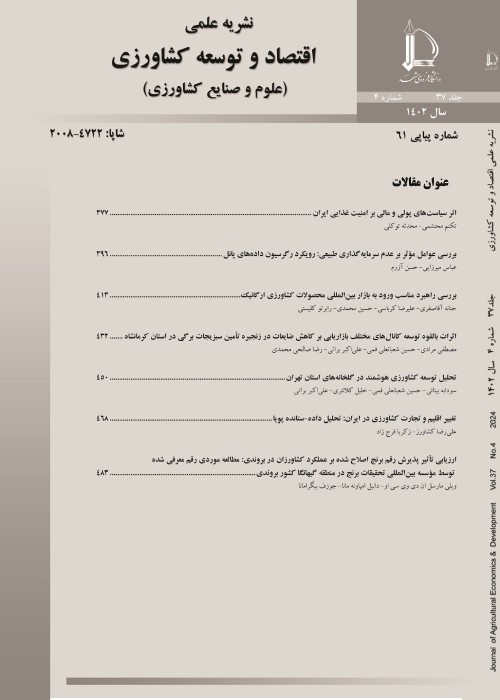Study of the Factors Affecting the Adoption Speed of New Wheat Seeds in Savojbolagh Township (Application of Survival Analysis)
Author(s):
Article Type:
Research/Original Article (دارای رتبه معتبر)
Abstract:
Introduction
Agriculture as one of the important Iranian economic sectors is in transition from traditional to industrial stage. Despite of many critical obstacles such as, drought and severe water shortage, prevalence of traditional irrigation methods and low level of irrigation efficiency, small farm plots and low level of farmer's education, self-sufficiency in main food items including wheat is defined as one of the goals with high priority in the five years national development plans. Due to above mentioned challenges government is not able to increase wheat acreage (extensive farming) thus, producing more from each unit of land (intensive farming) should be chosen as the best policy. In this course, it is indispensable to transfer available technical knowledge (such as new improved seeds) from research institutes to agricultural fields, and this should be seriously followed in national development programs. By this way, one question of high importance from policy making point of view is that what are the main factors determining rate and speed of adoption of new seeds by farmers? So the main objective of the present study was set to identify main influential drivers on speed of adoption of some recently developed wheat seeds in city of Savojbolagh, Alborz province.Materials And Methods
The present research not only introduces application of the so-called survival analysis method in Iranian agricultural economics literature for the first time, but also tries to explore the main affecting variables on the speed of adoption of five newly introduced improved wheat seeds (Bahar, Pishtaz, Pishgam, Parsi, and Sivand) by local farmers in city of Savojbolagh, Alborz province. The required data was collected via field survey and interview by 140 wheat growers selected by simple random sampling during 2015/16 cropping year. Dependent variable is defined as the difference (number of days) between times of supplying new seed in the region and time that farmer decided to apply it. Initial list of regressors (selected based on review of relevant literature) includes: age and sex of farmer, family size, education, yield, farming experience, acreage, experience in wheat farming, distance of farmer's home from offices (both in rural and urban areas) supplying new seeds and some qualitative variables controlling for attendance in extension and training workshops, insured crop, land ownership and farming as the main job.In the estimation process, different functional forms used in previous studies, were estimated via both backward elimination and forward selection algorithms in order to find the best explanatory variables for each model. Furthermore, suitable model specification is opted based on common model selection criteria including: Akaike Information Criteria (AIC), Schwarz Bayesian Criteria (SBC) and Likelihood Ratio (LR).
Results
Main results confirmed superiority of the Weibull model over its competing alternatives in terms of explaining power, economically, statistically and econometrically sound estimates. This is in line with previous works. To be specific, significant coefficients were found for non-farm income (qualitative variable), yield, farmer's experience and education, and training courses (qualitative variable). These positively and significantly affect the reduction of the time required to new seeds being adopted by farmers. Here, production per hectare (yield) has the greatest impact in terms of parameter magnitude. This suggests that the more productive seed would be adopted in a relatively shorter time. On the other hand, taking farming as the main job and the distance from home to urban shops offering new seeds revealed negative impact on the time to adopt improved seeds. Moreover, land ownership, farmer's age, crop insurance, quality of the seeds, and the distance from home to local shops presenting new seeds were found to be ineffective as far as the adoption time of new seeds was concerned.Discussion
Given the significant contribution of farming experience and attendance in training courses into the reduction of required time to accept new seeds, it is recommended to take advantage of the experiences of pioneers in the use of new wheat seeds in training other farmers and provide a basis for practical experience exchange among wheat growers. Here, the Ministry of Jihad-Agriculture (deputy in extension and education affairs) plays a key role. It should allocate required budget for setting workshops introducing new seeds to farmers. Moreover, simplicity of access to new seeds is another influential factor suggesting increase in the number of offices providing new seeds as another policy recommendation. This could be done as a public-private participatory (PPP) action. In order to be a job creative policy, it is highly recommended to engage agriculture- educated students into the process.Keywords:
Language:
Persian
Published:
Journal of Economics and Agricultural Development, Volume:32 Issue: 2, 2018
Pages:
123 to 137
magiran.com/p1875596
دانلود و مطالعه متن این مقاله با یکی از روشهای زیر امکان پذیر است:
اشتراک شخصی
با عضویت و پرداخت آنلاین حق اشتراک یکساله به مبلغ 1,390,000ريال میتوانید 70 عنوان مطلب دانلود کنید!
اشتراک سازمانی
به کتابخانه دانشگاه یا محل کار خود پیشنهاد کنید تا اشتراک سازمانی این پایگاه را برای دسترسی نامحدود همه کاربران به متن مطالب تهیه نمایند!
توجه!
- حق عضویت دریافتی صرف حمایت از نشریات عضو و نگهداری، تکمیل و توسعه مگیران میشود.
- پرداخت حق اشتراک و دانلود مقالات اجازه بازنشر آن در سایر رسانههای چاپی و دیجیتال را به کاربر نمیدهد.
In order to view content subscription is required
Personal subscription
Subscribe magiran.com for 70 € euros via PayPal and download 70 articles during a year.
Organization subscription
Please contact us to subscribe your university or library for unlimited access!


